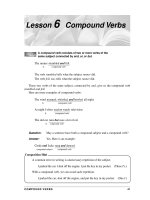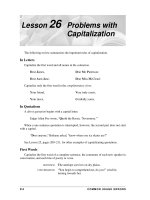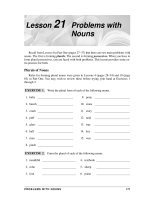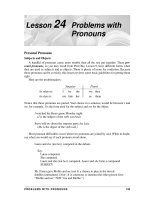tips for better written and oral english work brb4
Bạn đang xem bản rút gọn của tài liệu. Xem và tải ngay bản đầy đủ của tài liệu tại đây (106.54 KB, 1 trang )
English Banana.com
Tips for Better Written and Oral English Work
For more fun worksheets, games and quizzes log onto www.englishbanana.com now!
4.
• Always check your work. When you think you’ve finished, check it again. Use a
diction
ary to help you find spelling
s that you are not sure of.
•
Go to class regularly. Do your homework and hand it in on time. If your teache
r
doe
sn’t give you any homework, ask for some. Ask for extra work
to do at the
wee
kend. If your teacher doesn’t mark it, ask them to give you feed
back. If you don’t
unde
rstand something in class, ask your teacher. Discuss English work
with your
friend
s at break-time and after class. Practise talking in English. Talk abo
ut it with
your family. See if you can
help your family to improve their English. Encourag
e them
to go to a c
lass.
• In written work – answer the question! To answer the question you must read
the
que
stion! What does the question ask you to do? Make sure you do
what it asks. If it
says ‘u
se a key’ then use a key! If it says ‘circle the correct letter –
a, b, c or d’ then
circle the correct letter. If it
says, ‘write about your family’, write abo
ut your family.
•
Spend time deliberately learning vocabulary sets. You are always going to need
to
kno
w the meanings and correct spellings of days, months, numbers, clothe
s, food,
family members, you
r name and address, and so on. Practise at home. Make thi
ngs
much e
asier for yourself in class by learning these words in your free
time.
•
Plan written compositions before you start. Use a flow chart to help you think of
about
four or five ideas to write about or sketch out your ideas by writing notes on a rough
piece of pape
r. Think: what do you want to say in this piece of writin
g? Start with a
sho
rt introduction, then write a paragraph for each idea. Your final paragraph sh
ould
dra
w the ideas together into a conclusion. Each paragraph should contain abo
ut four
or five sho
rt sentence
s.
•
Spend time deliberately learning basic verb tables – both regular and irregular
–
esp
ecially the four key irregular verbs: ‘to be’, ‘to go’, ‘to have’ and ‘t
o do’. Learn
different tenses: pre
sent/past simple, present/past continuous and present/pas
t
perfe
ct. Learn the past participles of key irregular verbs, for exampl
e have/had,
do/don
e. Make sure you can use many common verbs like ‘eat’, ‘read’, ‘sleep’ and
‘go’ to talk about your daily activities in both the present and past tenses
.
•
Read English language books and magazines. Read signs and notices. Write do
wn
any words o
r phrases that you don’t understand and look them up. Keep a vocabu
lary
notebo
ok where you write down new words and phrases. Check it regular
ly.
•
Watch English-language TV. Use subtitles so that you can match the word
s to the
voice
s. Record programmes and play them back, pausing the action
if it’s going too
quickly for you. Use the int
ernet to find information in English. Use free onlin
e
transl
ation services to translate text into your language. Visit websit
es that have
game
s and resources for learning English. Print out materials and test yourself at
home. Recommend good websites that you find to your teachers and classmates
.
•
Use it or lose it! If you want to remember what you have learnt, make sure you us
e it
every day. Practise sp
eaking and listening, reading and writing every day. If possi
ble,
join a club or
society or do a sporting or voluntary acti
vity where you will meet native
English spe
akers. Us
e your initiative!
• Don’t give up! If it feels like you’re not learning anything, persevere. You are doing
fine.









